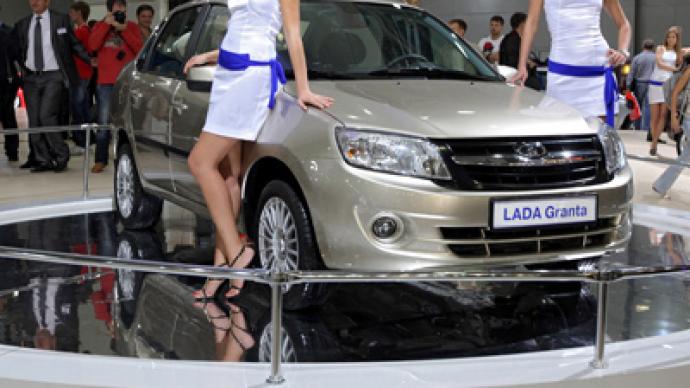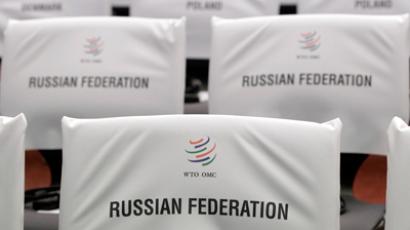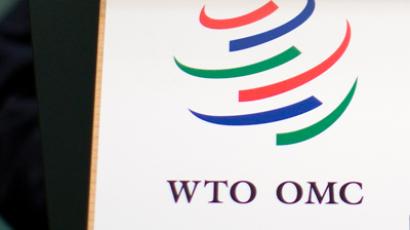Russia WTO debut: Cars and food get reduced import duties

Russia has lowered import duties on several types of meat, food products and automobiles in its first steps as a new World Trade Organization member.
Russia was the last of the large economies that was not a WTO member. On August 22 it officially became the 156th member of the trade body. Upon accession Russia is cutting the average import tariff by 5.9 percent, making imported goods cheaper. The cuts will initially affect the automobile industry and food products. According the customs tariff approved by the Eurasian Economic Commission import duties on foreign used cars will go down from 35 percent to 25 percent and new cars will go down from 30 to 25 percent. Import duties on certain types of tractors and trucks will also go down to 15 percent. As for the food products import duty on pork within the quota has been reduced to zero from the previous 15% while duty on pork imported outside the quota is dropping to 65 percent from the from the previous 75%. The main aim of the WTO is to lower international trade barriers and abolish customs duty and import quotas. Companies will benefit from selling into Russia’s $2 trillion economy at more competitive prices. Russia will gain an extra 11 per cent annually in GDP ($162bln) due to increased trade, according to a World Bank study.However the US may be left behind paying higher tariff rates to sell goods in Russia than other WTO members as the Jackson-Vanik Amendment is still in force. The law, passed by Congress in 1974, denies Russia normal trade relations with the US. This week the Head of the WTO said that America will lift cold war trade restrictions “within days”, but most probably this will not happen until after the November election, BusinessWeek reports. This gives European and Asian companies a head start, which nevertheless should be temporary, Charles Kupchan, a senior fellow at the Council on Foreign Relations, told BusinessWeek.
Finally a member, but what next?
Russia is the last member of the Group of 20 major economies to join WTO. The U.S. joined in 1995, China became a member in late 2001. WTO members are responsible for some 97% of global trade, according to the World Bank. But Russia has managed to enter the body on its own terms. The country intends to support its agriculture, regulate domestic gas prices and ban foreign banks from opening subsidiaries in Russia. However, both experts and businesses do not unanimously support joining the organization.Some estimates suggest Russian membership will help boost its economy by tens of billions of dollars each year. “If you look at the dynamics of foreign direct investment flowing into Vietnam what you see is that before the WTO membership the country was receiving approximately around 3-3.5 billion dollars’ worth of investment. After the WTO accession this figure went up two to threefold,” said Yaroslav Lissovolik, analyst at Deutsche Bank speaking to RT. “I think this is an indispensable part of operating in an environment that is competitive, that provides the impulses for change,” Lissovolik said.
M. Video, one of Russia's largest electronics retailers whose shelves are packed with foreign-made CD players and American movies, hopes Russia's entry into the WTO would bring more customers into their stores.“We believe that (entry into the WTO) is going to be a very good decision for our customers in the future, because they will be able to purchase goods with prices harmonized with other economies," said Enrique Fernandez, chief commercial officer of the company.But WTO entry comes at aprice. The uncompetitive domestic goods, which have long been propped up by state subsidies, could be threatened by the invasion of higher-quality imports. Some worry that struggling industries such as agriculture or the automobile industry, will also suffer from foreign competition.“The industry will not collapse immediately, AvtoVaz is going to continue steadily produce its 700,000 cars per year," says Ovanes Oganisyan, an analyst at the Moscow-based investment bank Troika Dialog. “But eventually there's going to be more competition, and if AvtoVaz doesn't change in seven years it will have to go out of business."Ivan Bonchev, investment Director at SI Capital, believes the industry’s prospects are not that gloomy.“For the next 5 to 6 years the benefits of the preferential import duties for companies, operating under the investment assembly regulations will be enjoyed by both domestic and foreign OEMs operating in Russia,” Ivan Bonchev told RT. “At the same time WTO customs duties on imported vehicles will be gradually reduced. Therefore the 5-6 years is enough time to reposition the industry competitively,” he added.On the positive side Russia could also benefit from the WTO when it comes to settling trade disputes. Recently Argentina filed a complaint against the European Union at the World Trade Organization. It challenges Spanish rules for allegedly discriminating against its biodiesel exports.“This is something Russia could certainly use after WTO accession especially in the effort against Russian steel exports, for example, and exports of chemicals,” says Lissovolik. “There are almost 100 restrictions now in existence against Russian exports,” he told RT.
Russia’s bumpy road to the WTO
Russia's entry into the World Trade Organization has been a long time in coming. It first applied for membership in 1993, soon after the breakup of the Soviet Union and negotiations have been rumbling on for the past 19 years even though the average accession period is only five to seven years.Negotiations were close to a result in 2009 but additional demands from existing members forced Russia to start a regional trade bloc with the ex-Soviet republics of Kazakhstan and Belarus.Talks resumed in earnest only in late 2010 and achieved a critical breakthrough in October when Russia finalized terms with the United States and the European Union. The main dispute concerned financial markets, Russia’s industrial assembly regime for cars, imports of agricultural products and the protection of intellectual rights. After six years of negotiations Russia and the Unites States signed Russia’s accession protocol in November 2006 at the Asia Pacific Summit in Hanoi. Another stumbling block for Russia’s entering the WTO was the lack of a compromise with Georgia concerning the customs control on the border with the break-away Republic of Abkhazia. In October 2011 Georgia accepted a Swiss proposal that paved the way for Russia's membership in the World Trade Organization.The WTO officially welcomed Russia as its newest member at a ceremony in Geneva in December 2012, where the WTO accession protocol was signed. Russia’s parliament ratified WTO entry in July 2012 after the country’s Constitutional Court ruled that the Protocol on Russia’s accession to the WTO is in line with Russian law. Russia officially became WTO’s 156th member on August 22, 2012.Russia will now bring down trade barriers to levels agreed in the negotiations while gaining broader access to foreign markets. It will benefit from a more efficient business environment that should help stimulate growth.














